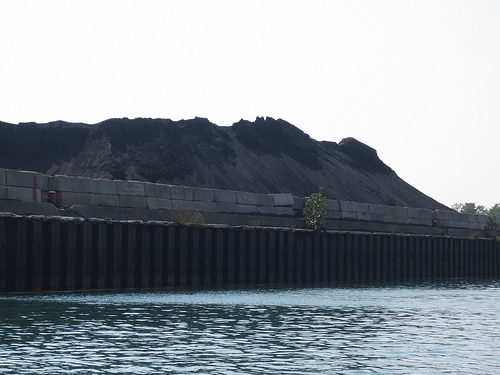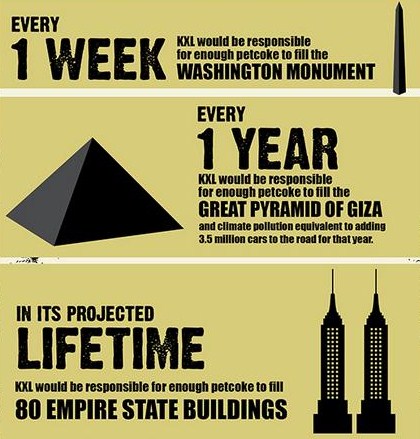After using Detroit as a toxic waste dumping ground, the billionaire industrialist Koch brothers are now piling their petroleum coke from tar sands oil refineries in Chicago.
Kiley Kroh of ThinkProgress writes that petroleum coke, or petcoke, “is building up along Chicago’s Calumet River and alarming residents.” The Chicago petcoke piles are owned by KCBX, an affiliate of Koch Carbon, which is a subsidiary of Koch Industries.
Petcoke is a high-carbon, high-sulfur byproduct of coking, a refining process that extracts oil from tar sands bitumen crude. The petcoke owned by Charles and David Koch is a byproduct of bitumen crude shipped to US refineries from the Alberta tar sands.
Midwest Energy News reports that “a mile and a half of the Calumet River shoreline holds big black piles,” some of which rise “about five stories high.” Locals say that the piles have grown recently, even as the BP Whiting refinery across the border in Indiana nears completion of a $3.8 billion upgrade to process more tar sands crude.
Detroit Mayor David Bing ordered the removal of the petcoke piles from his city in August, after protests by residents and local politicians concerned about the health and environmental impacts. Residents complained of “respiratory problems as the thick, black dust was blowing off the piles and into their apartments,” reports ThinkProgress. The Detroit petcoke is being moved to Ohio.
A January 2013 report by Lorne Stockman of Oil Change International estimates that taking petcoke into consideration would raise annual Keystone XL GHG emissions “13% above the State Department’s calculations” for the pipeline.
While petcoke can’t be used as fuel in Canada and the US because of its high GHG emissions, the waste can be sold as a cheaper, more polluting alternative to low-grade coal in countries with looser environmental and health regulations. There is high demand for petcoke in countries like Mexico, China and India, where its emissions further exacerbate the effects of tar sands production on climate change.
The waste piles accumulating in the U.S. Midwest are only the beginning, should Keystone XL be approved. As this infographic from Oil Change International shows, if the pipeline is built, “the tar sands oil flowing through it would result in massive amounts of this dirty byproduct.”
Credit: Oilchange International
Stockman’s report calculates that diluted bitumen delivered to the US via Keystone XL would produce about 15,000 tons of petcoke a day, all waiting to be exported as dirty fuel in piles like the ones plaguing Detroit and Chicago.
Petcoke produces 10 to 15 per cent more CO2 than coal, bringing its additional emissions to “50,000 tons of CO2 every day or over 18.3 million tons (16.6 million metric tons) of CO2 a year.”
“The Petcoke piles in Chicago are another symptom of Obama’s flawed “All of the Above” energy strategy. It’s time we actually made choices about the kind of energy we want rather than taking anything we can get,” Stockman told DeSmog Canada.
Chicago can choose to follow Detroit’s lead, fighting back against the Koch brothers’ dumping of petcoke. But the fact remains that petcoke is a growing environmental threat directly related to tar sands production and expansion, and remains a dangerously overlooked threat when considering the full consequences of the Keystone XL pipeline.
President Obama would be wise to sit up and take notice of the petcoke piles already threatening health in US cities when weighing whether to approve the pipeline.
Image Credit: Josh Mogerman / Flickr
Subscribe to our newsletter
Stay up to date with DeSmog news and alerts







